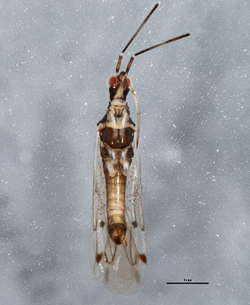Difference between revisions of "Dicyphus errans (predator)"
From Pestinfo-Wiki
| (2 intermediate revisions by the same user not shown) | |||
| Line 2: | Line 2: | ||
{{LiteratureDB1|{{PAGENAME}}|browse,hostsP}} | {{LiteratureDB1|{{PAGENAME}}|browse,hostsP}} | ||
[[File:Dicyphus errans BOLD Systems.png|250px|thumb|''Dicyphus errans'' (click on image to enlarge it)<br/>Author(s): BIO Photography Group, Biodiversity Institute of Ontario<br/>Source: [http://www.boldsystems.org/index.php/Taxbrowser_Taxonpage?taxon=Dicyphus+errans&searchMenu=taxonomy&query=Dicyphus+errans BOLD System]]] | [[File:Dicyphus errans BOLD Systems.png|250px|thumb|''Dicyphus errans'' (click on image to enlarge it)<br/>Author(s): BIO Photography Group, Biodiversity Institute of Ontario<br/>Source: [http://www.boldsystems.org/index.php/Taxbrowser_Taxonpage?taxon=Dicyphus+errans&searchMenu=taxonomy&query=Dicyphus+errans BOLD System]]] | ||
| − | <font color="#008000">'''''Dicyphus errans'' (predator)'''</font> Wolff | + | <font color="#008000">'''''Dicyphus errans'' (predator)'''</font> (Wolff, 1804) |
| − | + | This bug is a beneficial generalist predator in southern Europe and northern Africa. Actually it is omnivorous and also feeds on plants. It is of interest as a biological control agent in crops like tomatoes and other vegetables. For example, it feeds on the tomato moth, ''[[Tuta absoluta]]'', ''[[Bemisia tabaci]]'' as well as aphids and has been studied for use in greenhouses (e.g. [[Journal of Applied Entomology (2015) 139, 333-341|Messelink et al., 2015]]). | |
[[Category:Dicyphus (genus - predators)]] | [[Category:Dicyphus (genus - predators)]] | ||
Latest revision as of 16:56, 11 October 2019
| Literature database |
|---|
| 14 articles sorted by: |
| • year (recent ones first) |
| • research topics |
| • countries/regions |
| • list of pest species |

Dicyphus errans (click on image to enlarge it)
Author(s): BIO Photography Group, Biodiversity Institute of Ontario
Source: BOLD System
Author(s): BIO Photography Group, Biodiversity Institute of Ontario
Source: BOLD System
Dicyphus errans (predator) (Wolff, 1804)
This bug is a beneficial generalist predator in southern Europe and northern Africa. Actually it is omnivorous and also feeds on plants. It is of interest as a biological control agent in crops like tomatoes and other vegetables. For example, it feeds on the tomato moth, Tuta absoluta, Bemisia tabaci as well as aphids and has been studied for use in greenhouses (e.g. Messelink et al., 2015).